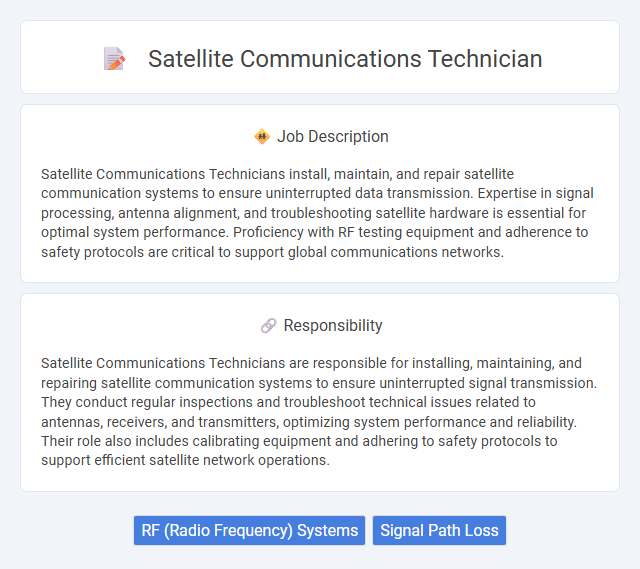
Satellite Communications Technicians install, maintain, and repair satellite communication systems to ensure uninterrupted data transmission. Expertise in signal processing, antenna alignment, and troubleshooting satellite hardware is essential for optimal system performance. Proficiency with RF testing equipment and adherence to safety protocols are critical to support global communications networks.
Individuals with strong technical aptitude and problem-solving skills are likely well-suited for a Satellite Communications Technician role, as the job involves maintaining and troubleshooting complex satellite systems. Those comfortable working in dynamic environments and handling electronic equipment under varying weather conditions may find the position fulfilling. People who prefer routine tasks or limited physical activity might struggle with the demands and variability of this technical field.
Qualification
A Satellite Communications Technician requires expertise in electronics, telecommunications, and signal processing, often supported by an associate degree or technical certification in satellite communications or a related field. Proficiency in installing, maintaining, and troubleshooting satellite systems, along with knowledge of RF technologies and networking protocols, is essential. Candidates must demonstrate strong problem-solving skills and the ability to interpret technical manuals, schematics, and communication systems software.
Responsibility
Satellite Communications Technicians are responsible for installing, maintaining, and repairing satellite communication systems to ensure uninterrupted signal transmission. They conduct regular inspections and troubleshoot technical issues related to antennas, receivers, and transmitters, optimizing system performance and reliability. Their role also includes calibrating equipment and adhering to safety protocols to support efficient satellite network operations.
Benefit
Satellite Communications Technicians likely enjoy benefits such as competitive salaries, opportunities for overtime pay, and access to cutting-edge technology. They probably receive health insurance, retirement plans, and paid leave as part of their employment package. Job stability and chances for career advancement within the telecommunications industry also seem probable advantages.
Challenge
A Satellite Communications Technician likely faces the challenge of diagnosing and resolving complex technical issues in high-pressure environments where system downtime can impact critical communications. The demand for adapting rapidly to evolving satellite technologies and protocols may require continuous learning and skill enhancement. Troubleshooting signal interference and maintaining reliable connectivity in varying atmospheric conditions are probable sources of job difficulty.
Career Advancement
Satellite Communications Technicians gain expertise in installing, maintaining, and troubleshooting satellite systems, which opens opportunities for roles such as Systems Engineer or Network Operations Manager. Proficiency in advanced technologies like fiber optics and microwave transmission enhances career growth and salary potential. Certifications from organizations like the Society of Satellite Professionals International (SSPI) support professional development and leadership positions in the aerospace and telecommunications industries.
Key Terms
RF (Radio Frequency) Systems
Satellite Communications Technicians specializing in RF systems are responsible for installing, maintaining, and troubleshooting radio frequency equipment essential for satellite signal transmission and reception. Their expertise includes calibrating RF amplifiers, antennas, and transceivers to ensure optimal signal quality and minimizing interference across various frequency bands. Proficiency with spectrum analyzers, signal generators, and modulation techniques is critical for sustaining reliable satellite communication networks.
Signal Path Loss
Satellite Communications Technicians analyze and mitigate signal path loss by evaluating factors such as atmospheric attenuation, free-space loss, and obstacles interfering with signal transmission. They employ specialized equipment to measure signal strength and optimize antenna alignment, ensuring reliable data transfer between ground stations and satellites. Expertise in signal path loss enables technicians to troubleshoot connectivity issues and enhance overall network performance in satellite communication systems.
 kuljobs.com
kuljobs.com